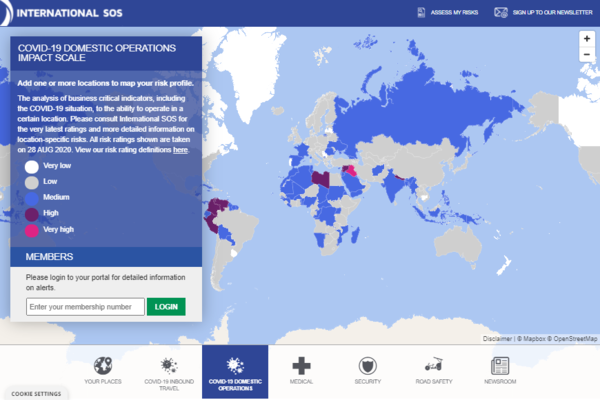In many parts of the world the transmission of Covid-19 has been managed and the risk of infection reduced. But any complacency could quickly see things change. The last few weeks have proven how quickly the tide can turn, most notably seen in the likes of Australia, New Zealand and many parts of Europe. What would have been a limited risk trip a week ago could suddenly escalate into high risk with regionalised spikes in infections.
Right now, being informed is perhaps more important than at any other time during the pandemic's spread and it is essential that travel managers are able to take quick decisions based on easy to follow and regularly updated information. Under duty of care obligations companies have the legal responsibility to do everything reasonably practical to protect the health and safety of employees. The stakes are certainly a lot higher than they have ever been before.
There is a wide spread in individual traveller sentiment, with some raring to get back into the travel routine, others may still feel uncomfortable with the idea of travelling for the foreseeable future, while some category feel the risk is to high while so much uncertainty remains over Covid-19. No business can guarantee preventing the spread of infection, but vital precautionary steps are required to minimise risks, fulfil duty of care responsibilities and promote workforce resilience.
Perhaps the first port of call should be to avoid reading mainstream news sites where sensationalist headlines and general reporting has been highlighting the many negatives of the pandemic rather than providing the balanced coverage that is essential to enable people to make their own informed opinions.
This is where travel managers play an increasingly important role in the current environment. We could go as far as saying they are now essential in maintaining traveller duty of care, especially from a businesses point of view. They may have been somewhat overlooked by some travellers in the past as perhaps interfering in their own travel plans, urging the need to keep them informed and pushing the need to book on policy. An efficient travel manager is now aware of the every changing Covid-19 landscape to ensure every business trip is as safe as possible based on the information available.
The return to business is a complicated one. As International SOS, the health and security risk management specialist, highlights: "failure to manage a safe return could result in a backwards step in productivity, in the fight against Covid-19, and could even result in costly prosecutions".
It has recently launched a new map, representing the impact of Covid-19 on health, security and logistics. It takes into account local governmental guidelines and an assessment of what is necessary for a particular workforce, both from a logistical perspective and personal one and is one of a number of tools that have been developed to support businesses over this challenging period.

The International SOS platform delivers a Covid-19 impact scale that assess the current impact of the disease on domestic operations or inbound travel. The respective scales take into account integrated health, security and logistics considerations - three key factors in business sustainability during the pandemic. "The impact is dynamic and will change as outbreaks progress and mitigation measures are implemented and withdrawn," it highlights.
As we rebuild the corporate travel industry, access to up to date and accurate information is vital as the effects of Covid-19 continue to fluctuate. "We know that this can potentially make the difference between returning to sustainable or to extremely limited operations," acknowledges Dr Neil Nerwich, group medical director, assistance worldwide at International SOS.
While we cannot fully pre-empt the course of the pandemic or its wide-ranging impacts, "being agile enough to quickly implement strategies based on insights will help minimise business impact and, critically, protect the workforce," he explains.
Similarly, while Covid-19 is grabbing attention it is essential that we don't take our eyes of the other threats that continue to impact travel, namely natural disasters, political tensions, elections and civil unrest. These will continue, with some of these actually exacerbated as a result of the pandemic.
A balanced approach is needed to assess overall risk and implement appropriate strategies to protect and strengthen business. It is not a one-size fits all solution and companies need to work hard to find the right solution for them and their employees, but ensuring that traveller safety is at the heart of every action.